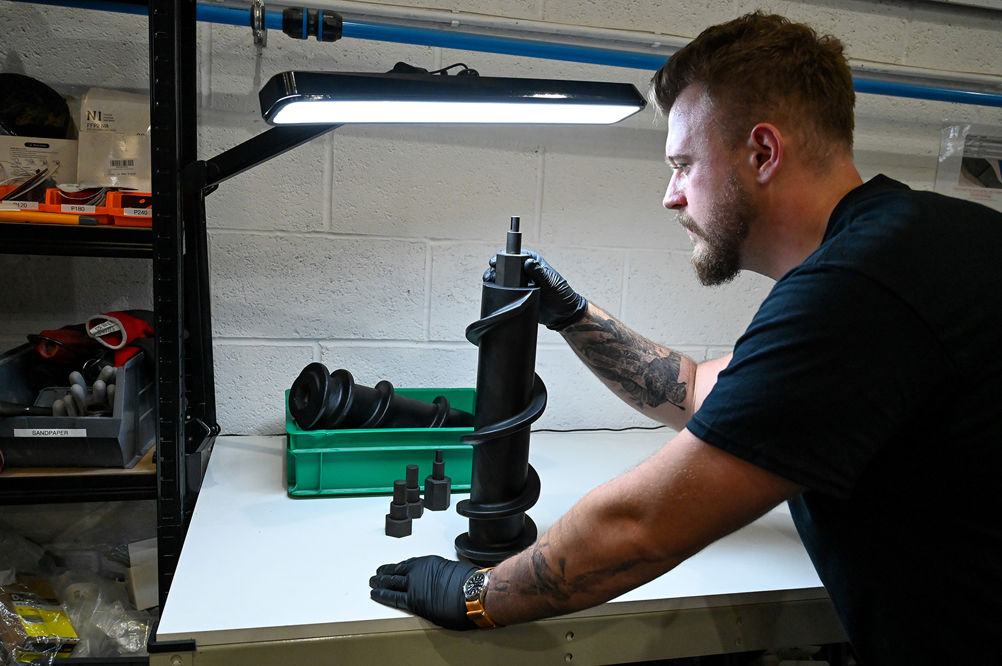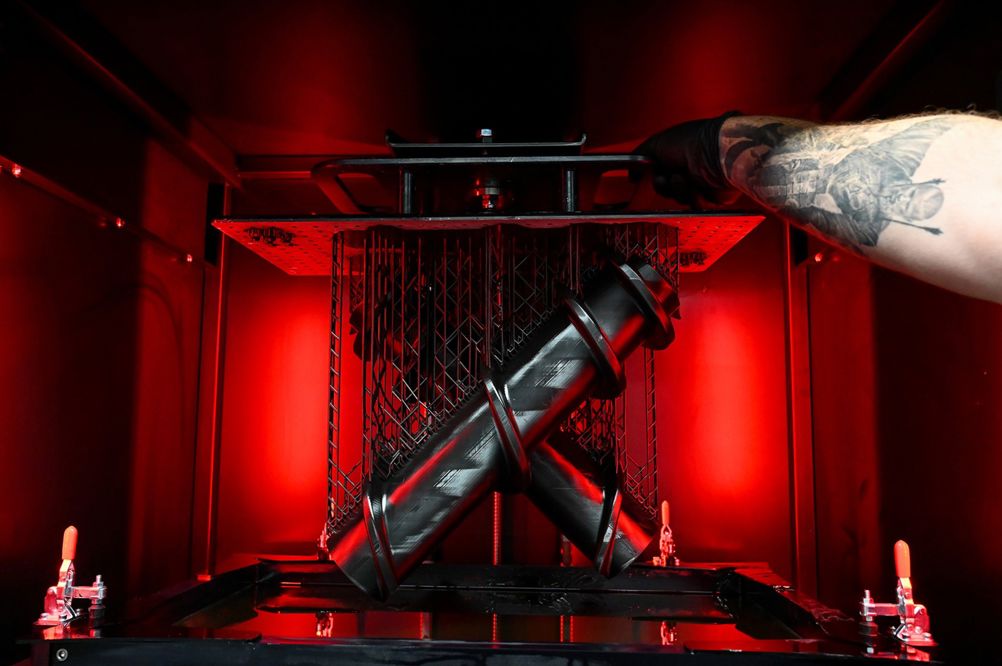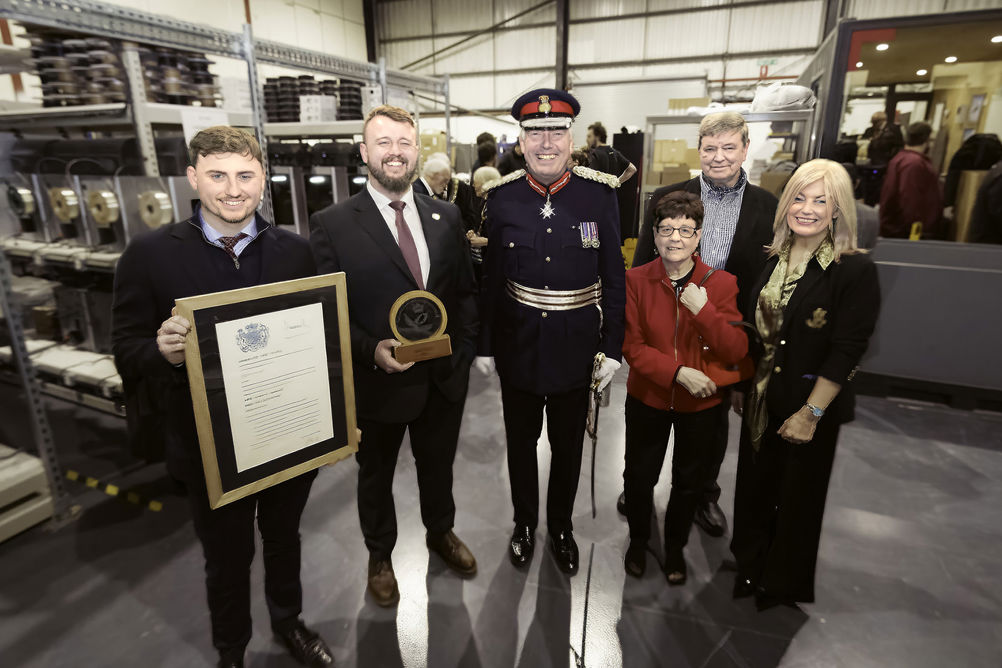Only founded seven and a half years ago, it’s fair to say that Warwickshire-based 3D printing specialist, Ryse 3D, has achieved a tremendous amount in very little time.
The company – which now employs 26 people at its 8000 sqft facility, has produced over 2 million parts for cars on the road, enhanced 23 hypercar programmes, and has received a number of prestigious awards – is quickly becoming a leader in the Additive Manufacturing space, despite being started “almost by accident” by its founder and CEO, Mitchell Barnes.
“I essentially started the business in my mum’s garage whilst I was studying at Coventry University and working as an engineering consultant at Penso,” Mitchell said. “I had to make a 3D model in order to graduate, but I couldn’t afford to make the model and the university couldn’t help. So, I designed and built my own Fused Deposition Modeling (FDM) printer to manufacture the model, paid to get it painted, and then went and hijacked everyone else’s projects.
“I made all of my coursemates’ models, selling them for half the price that the university was charging, and used that money to quit my job. I pulled in every contact I had from working in engineering, including my placement at JLR, and started doing consultancy for advanced engineering companies.”
The company began with offering 3D printing services for primarily automotive and Formula One companies, though its offerings and applications have expanded massively in recent years.
Its production printing services – creating parts using Multi Jet Fusion (MJF), Selective Laser Sintering (SLS), Stereolithography (SLA) and FDM 3D printing, to name a few – still makes up around 80 per cent of Ryse’s work, with the company offering traceable, repeatable, on demand production to the highest of standards.

Parts can be created and delivered as fast as 16 hours from order, with the company using a wide range of technologies and materials in-house to achieve this turnaround. Priding itself on not being another ‘mindless Bureau,’ Mitchell said his company works closely with all of its customers to select the right materials, volume, timing and technology for their individual parts, ensuring that each product is fit for purpose.
“The other 20 per cent of work is producing 3D printed tooling parts,” he added. “Things like moulds and tools for carbon fibre manufacturing, press forming, metal bashing and press braking. A lot of this is for the automotive, aerospace, medical, industrial and consumer markets.”
REVOLUTIONARY TECHNOLOGY
Perhaps the company’s most impressive feat, though, is developing its own large format 3D printer 'designed for SMEs, disruptors and entrepreneurs.'
LANDR, a spin-out of Ryse 3D, unveiled the LANDR 500 in June 2024: a 500 x 500 x 500mm build volume FDM printer, that gives users the scope to build larger and more complex parts, and can be applied to rapid prototyping and volume production for end-use.
“We designed, built and developed the printer from scratch. It can produce parts effectively three times faster than anything else that’s on the market at the moment, and it retails for £15,000, rather than a competitive machine that averages around £150,000,” explained Mitchell.
“This technology is simply not built in the UK, but we knew we had the knowledge and technical expertise to change that. It has been a real labour of love, but we have now built and are successfully using ten printers at Ryse 3D. With 30,000+ hours of use so far, there’s no better testing ground than a company supplying parts to 18 of the world’s Hypercars.”
The 3D printer offers a 100°c heated chamber, 500°c Hot End, 140°c Bed, speeds of 500mm/s, Bondtech LGX extruder, double skin gold reflective insulation, a built-in camera and auto nozzle wipe and nozzle purge, with heated filament dryer coming as standard.
A user-friendly, intuitive interface has been designed for operators of all experience levels, while a large build volume and print speed enables printing of multiple smaller parts or large components in a single run, improving productivity in the process.

“We are also developing a pellet-based machine, which will be able to reduce raw material cost by about 90 per cent. This is a 1 x 1 x 1 metre machine that gives customers the opportunity to use 60,000 materials, because they won’t have to turn their materials into a filament, to then wind it to print with it. Instead, it’s just the pellets going into the printer, and out comes the part.”
And while Ryse 3D can’t name the specific companies it is working with, the range and quality of its technology and services has led to some amazing projects so far.
Automotive is still the company’s biggest focus, with its pellet printing and polymer developments meaning that it now makes more sense to manufacture much larger components, that would have otherwise been multiple smaller parts, into one that is both cost-effective and durable. Today, Ryse 3D believes that around 700 – 800 parts per car are applicable for 3D printing – a number which it said will only continue to grow.
The company has manufactured full ducting systems for engines, for instance, 3D printing extraordinarily custom turbo intake parts despite extremely tight packaging spaces. “If these were fabrication,” Mitchell said, “then you’d be looking at between £3000 – £4000 a set. When we 3D print them on our LANDR printers, you’re looking at delivery of around £600 a set. There’s ginormous cost savings, coupled with complete design freedom.”
The medical industry is also increasingly investing in 3D printed technology, with Ryse 3D already printing insoles and spinal braces for people living with scoliosis – a project which it said will soon be expanded to help 1000s of patients a year.
“AI has helped our development massively, as it has allowed us to measure the efficiency of our machines, and use machine learning to help us print better. We can see where the parts are more dimensionally accurate, when they’re stronger, and when they perform to the mechanical properties that we want per product. We’re always looking for continuous improvement, and AI allows you to do that with your eyes closed.”
AWARD WINNING
Ryse 3D’s continuous growth and success has not gone without recognition, receiving a number of awards since its foundation in 2017, including the King’s Award for Innovation, awarded to Mitchell and his team in December, 2024.

“For a company of our size to be recognised at this stage is tremendous and it’s all down to the courage, commitment and hard work of our staff,” Mitchell said. “The profile of the King’s Award is like no other and we have seen huge interest from potential customers in sectors we never thought would be suited to Additive Manufacturing."
Looking ahead, Ryse 3D’s drive and subsequent success shows no signs of faltering, with Mitchell setting his sights on an expansion into the US and growth of its medtech offerings in the near future.
“It’s seems odd to say, but we’re not actually a 3D printing company – we’re a technology manufacturing business that uses Additive Manufacturing as its chosen tool, to deliver solutions to our customers.
“We’ll continue to only print something if we think it is appropriate for print. We want to make the right things for the right reasons, using the right materials that makes sense for our customers. I think, going forward, there’s going to be a huge focus on Additive Manufacturing scalability – but that can only happen if large key companies that are ‘gouging’ the market, push industry change to go cheaper.
“We’re in it for the long term, wanting to further develop our own technology in-house – prioritising low cost, high volume, high quality machines and components, to continue to stay ahead of the curve.”










